Abstract
We interviewed 328 men diagnosed with prostate cancer before the age of 75 years and 328 age-matched population controls. The principal hypotheses were that risk would increase with a high intake of total or saturated fat and would decrease with a high intake of carotene (beta-carotene equivalents) or lycopene. We also examined the associations of other nutrients and foods with risk. There was no evidence for an association between fat intake and risk, although the average fat intake was high and the range of fat intakes was narrow (medians of lower and upper thirds of percentage of energy from fat among controls were 34.3% and 42.9% respectively). Risk was lower in subjects with higher carotene intake: odds ratios 0.65 (95% CI 0.45-0.94) and 0.76 (0.53-1.10) in the middle and upper thirds of carotene intake respectively (P for trend = 0.150). Lycopene was not associated with risk. Among 13 other nutrients examined, the odds ratios in the top third of intake were below 0.8 for: potassium, 0.74 (0.51-1.09; P for trend = 0.054); zinc, 0.73 (0.49-1.08; P for trend = 0.126); iodine, 0.75 (0.51-1.11; P for trend = 0.077); vitamin B6 food only, 0.77 (0.53-1.12; P for trend = 0.077); and vitamin B6 including supplements, 0.70 (0.48-1.03; P for trend = 0.029). Among 18 foods examined, statistically significant associations were observed for: garlic as food, > or = 2/week vs never, 0.56 (0.33-0.93); garlic including supplements, > or = 2/week vs never, 0.60 (0.37-0.96); baked beans, > or = 2/week vs < 1/month, 0.57 (0.34-0.95); and garden peas, > or = 5/week vs < or = 3/month, 0.35 (0.13-0.91). This study does not support the hypothesis that fat increases risk and is equivocal in relation to carotene. The possible relationships of vitamin B6, garlic, beans and peas with risk for prostate cancer should be further investigated.
Full text
PDF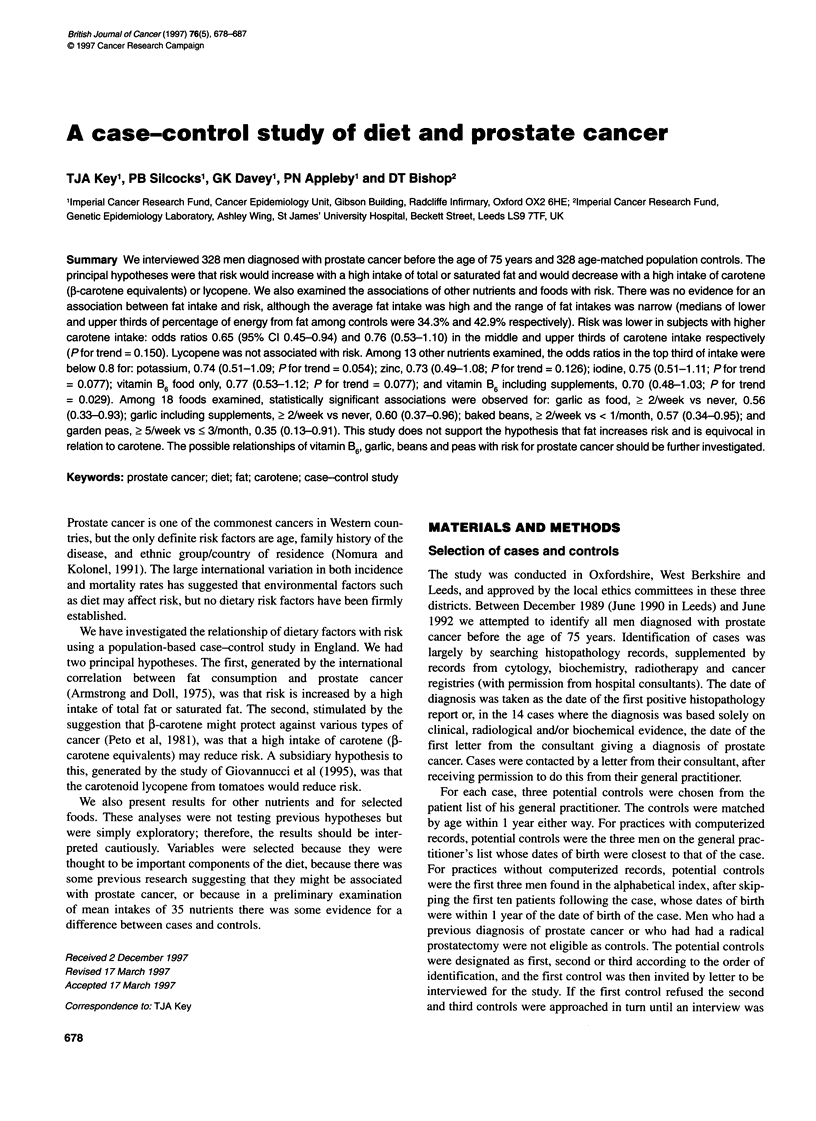
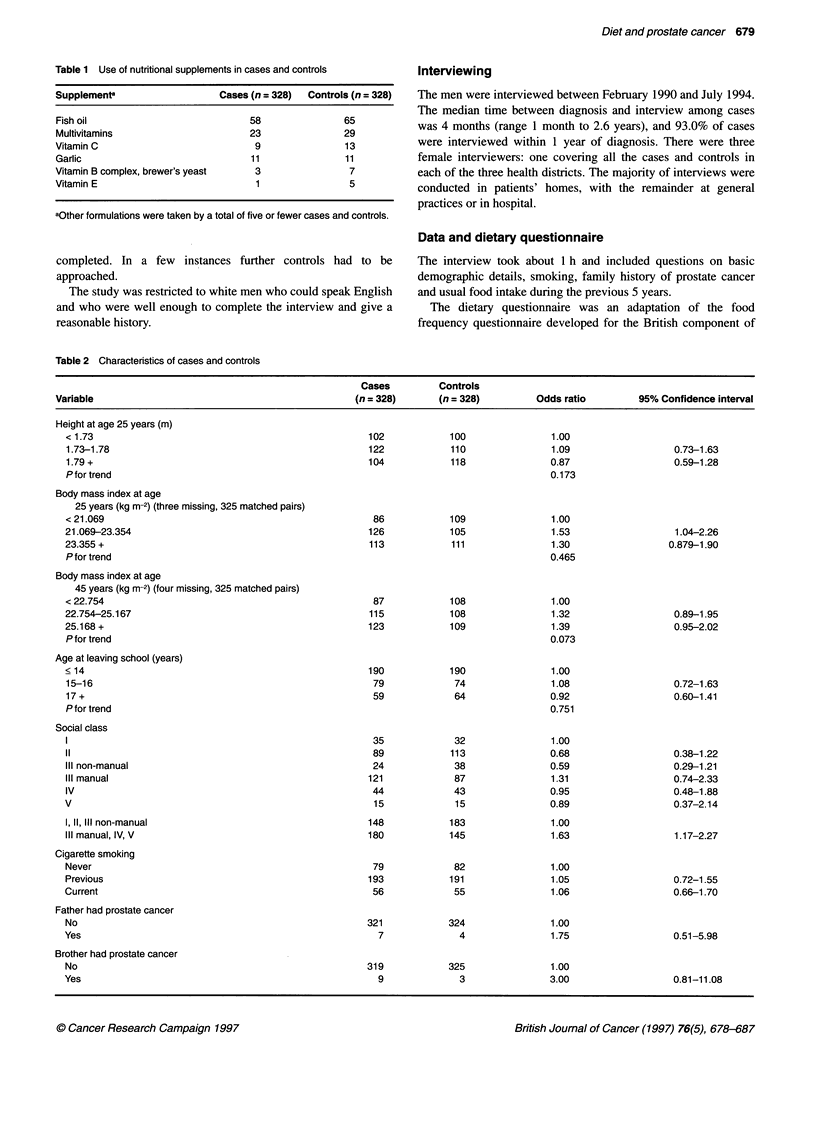
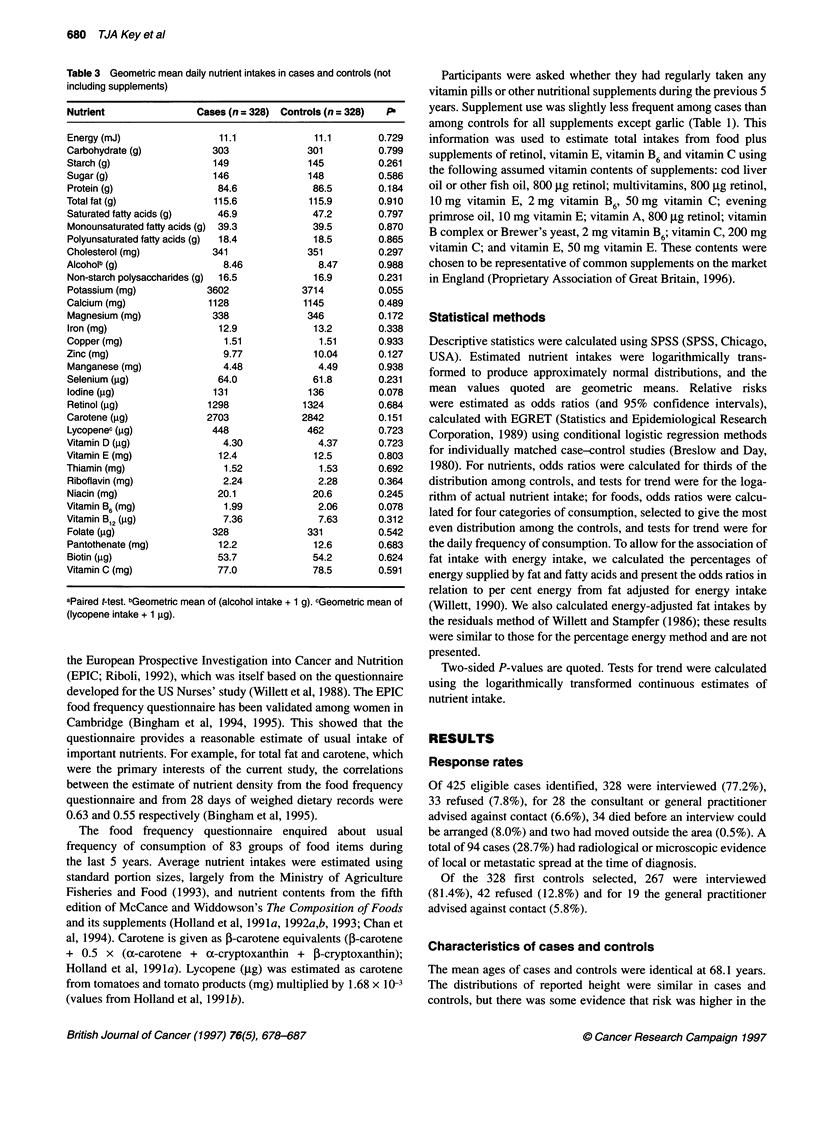
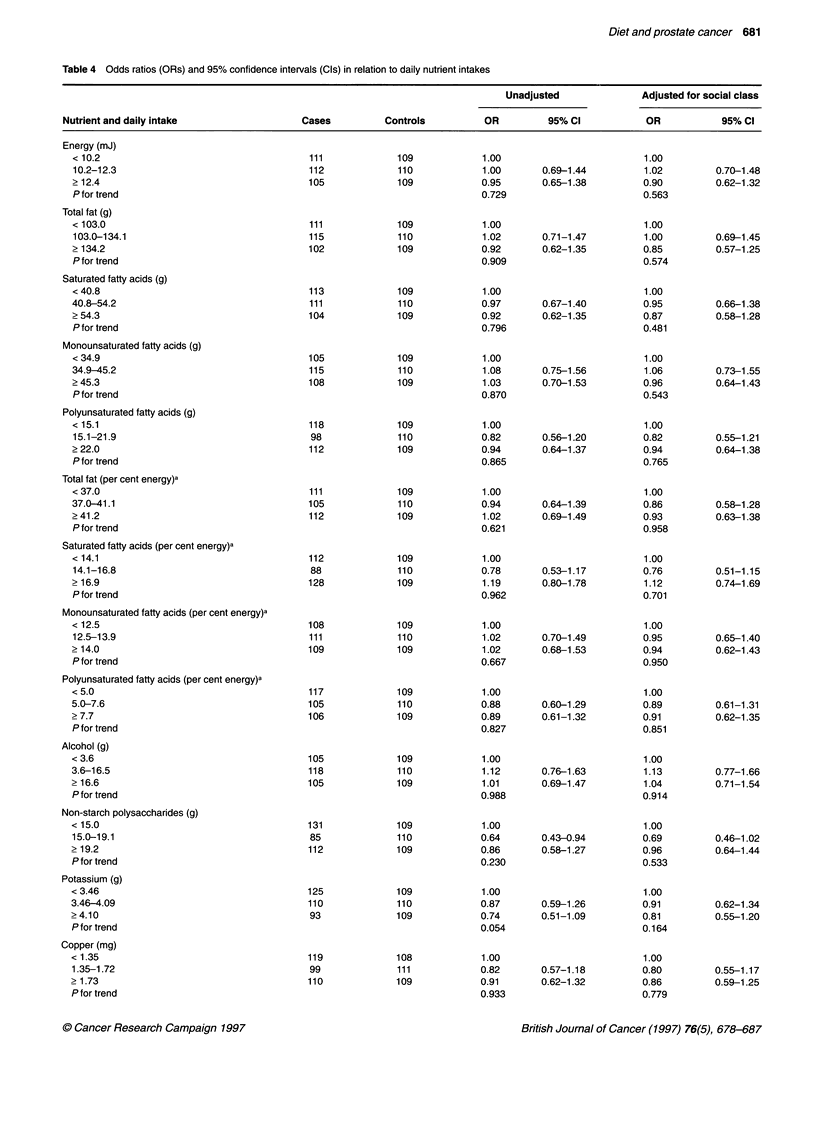
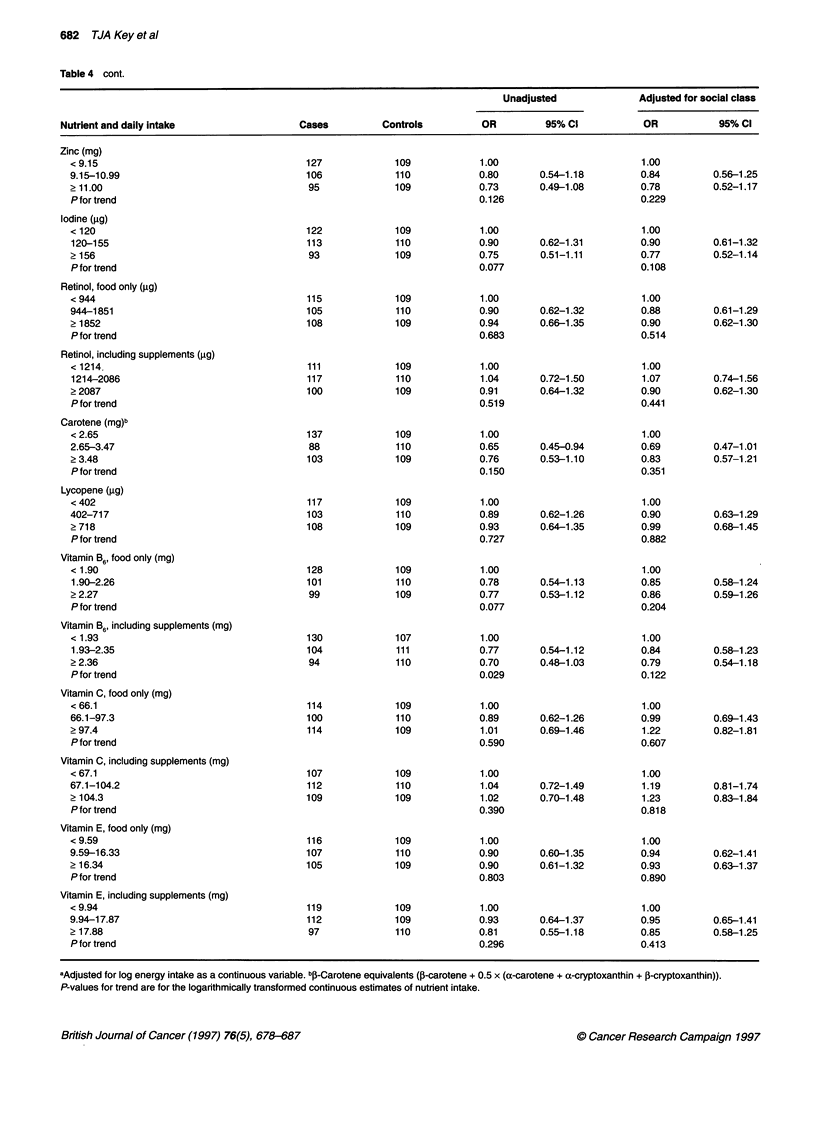
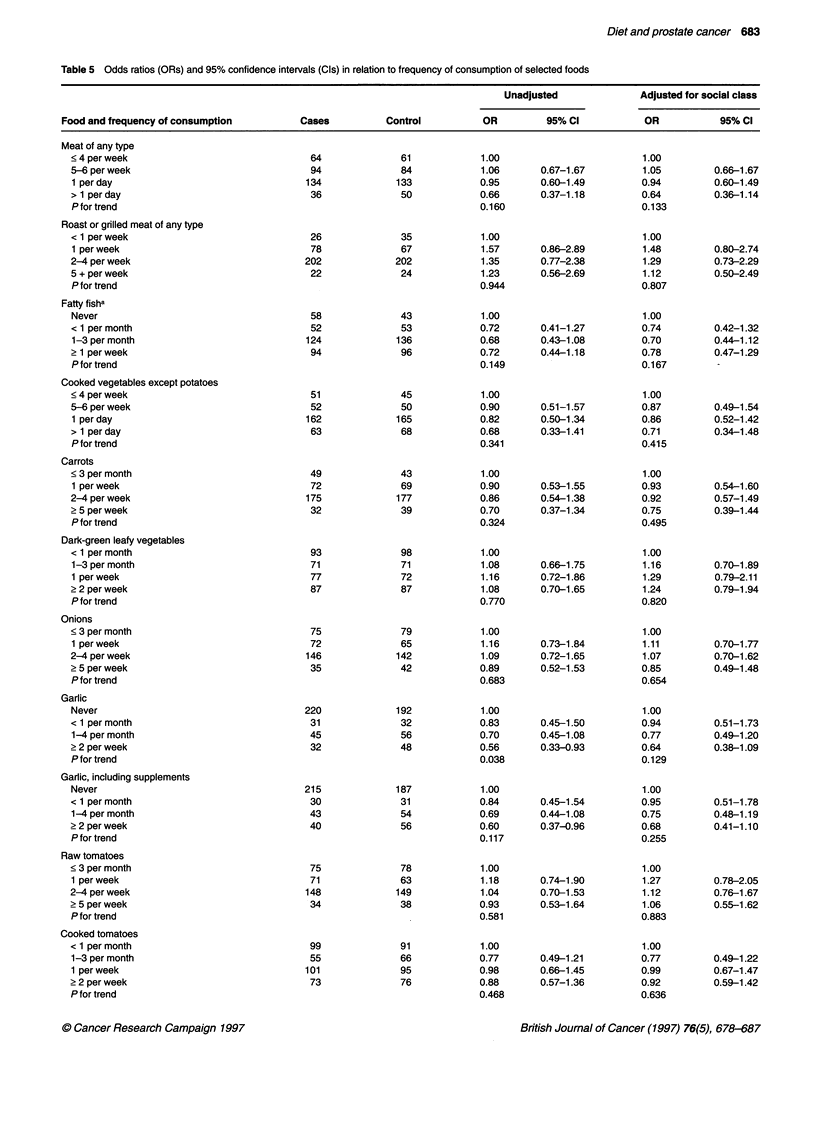
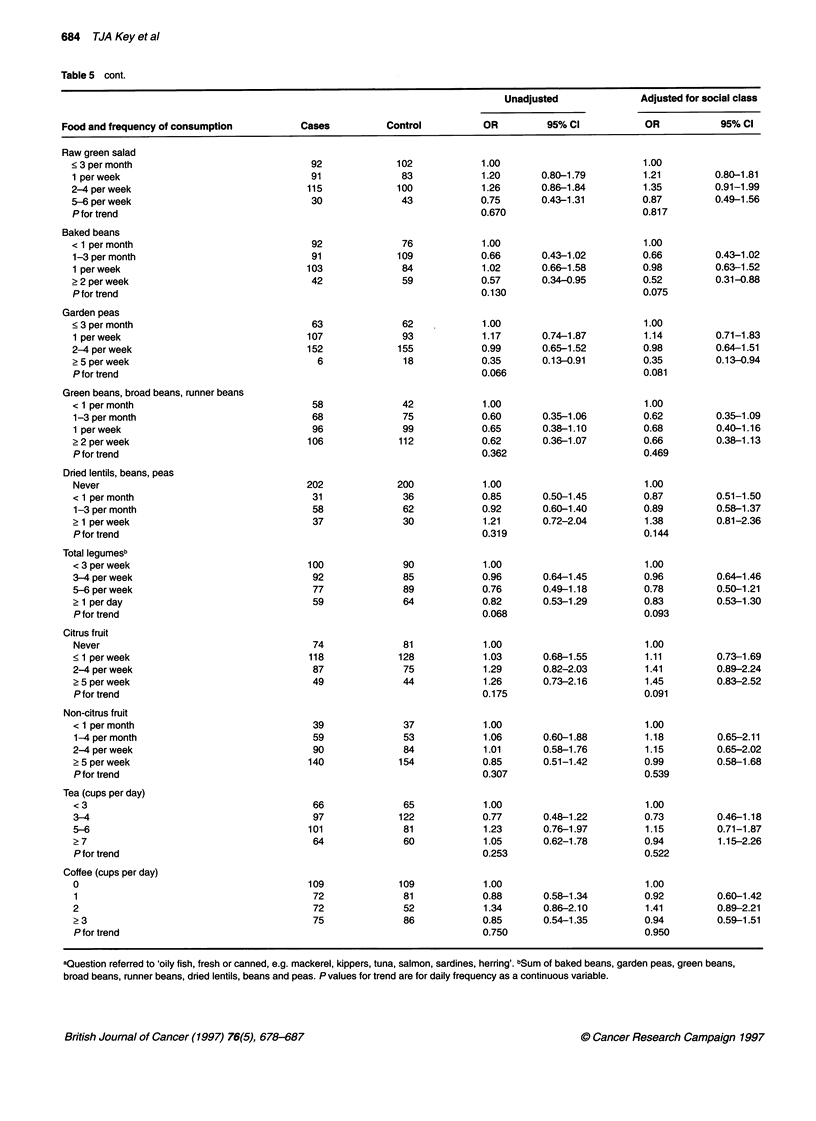
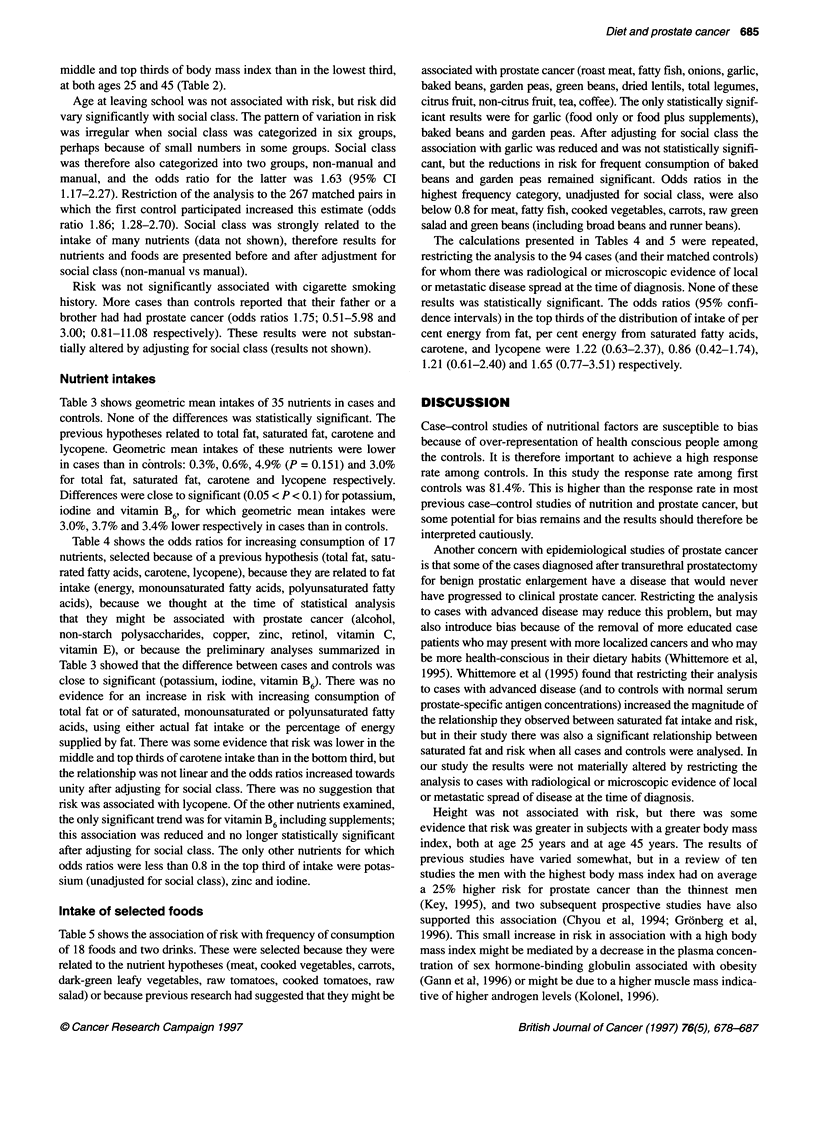
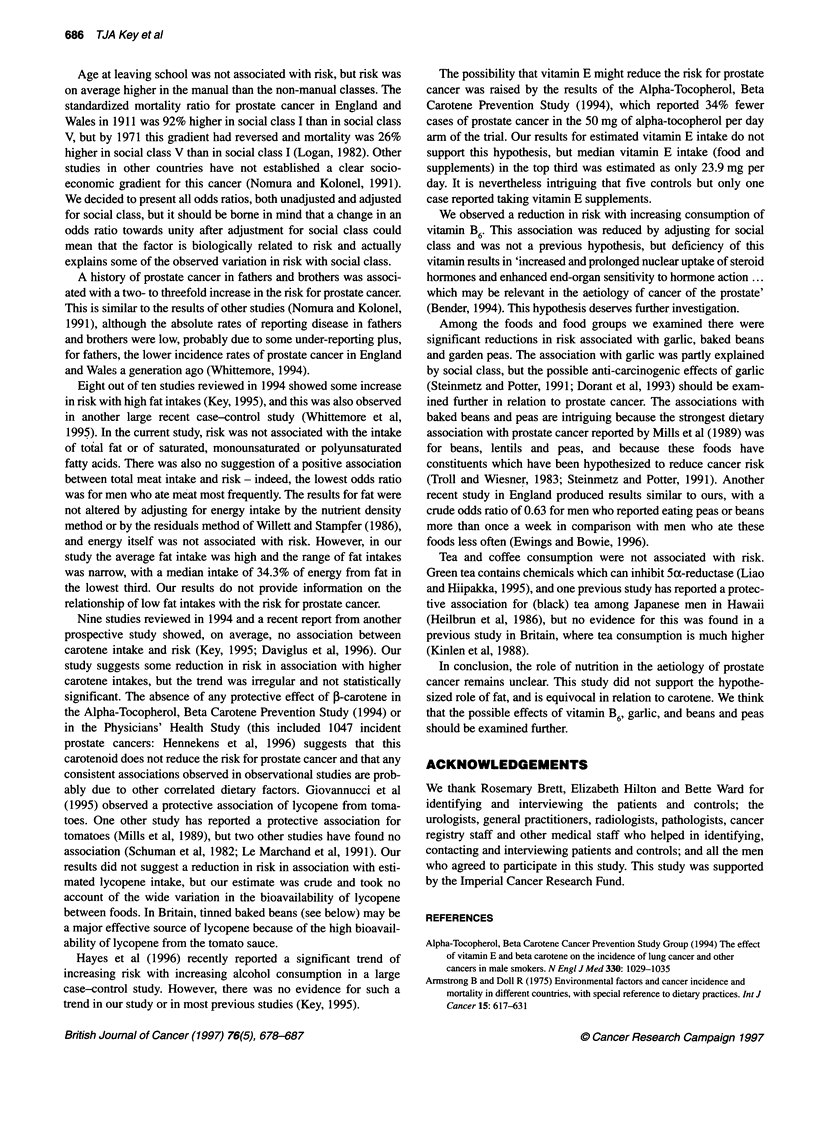
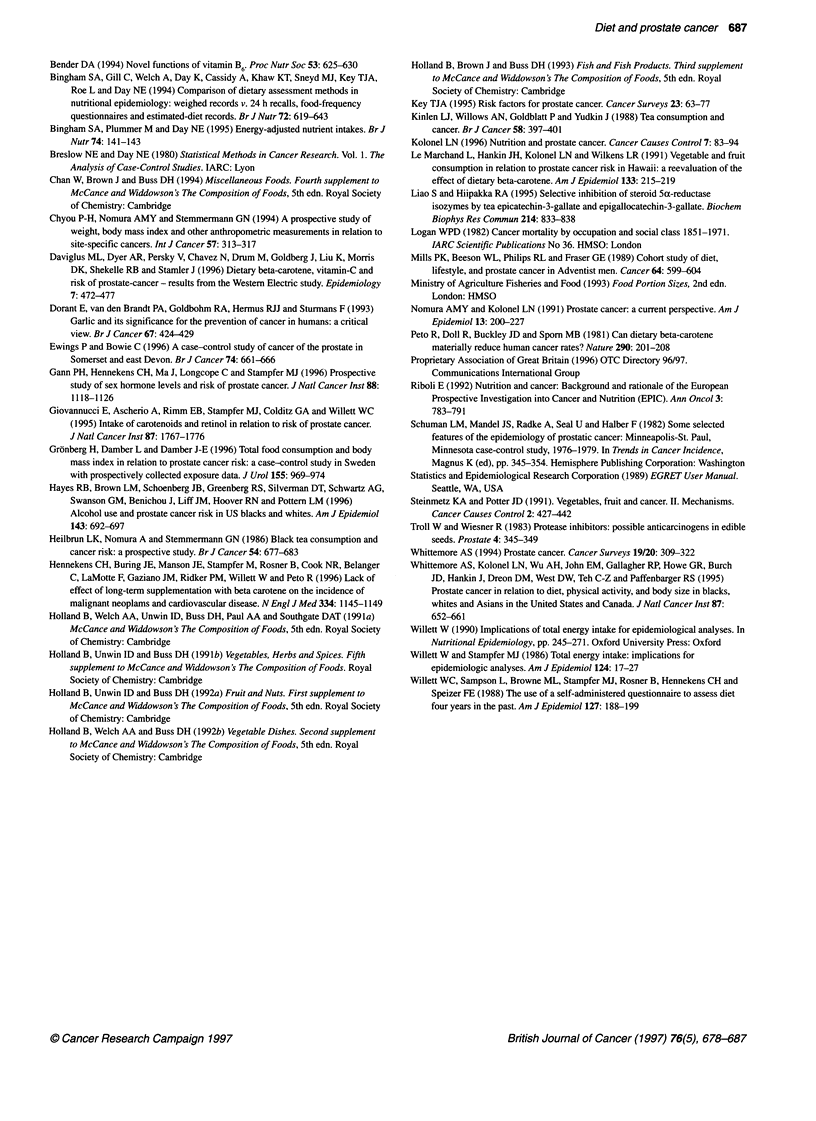
Selected References
These references are in PubMed. This may not be the complete list of references from this article.
- Armstrong B., Doll R. Environmental factors and cancer incidence and mortality in different countries, with special reference to dietary practices. Int J Cancer. 1975 Apr 15;15(4):617–631. doi: 10.1002/ijc.2910150411. [DOI] [PubMed] [Google Scholar]
- Bender D. A. Novel functions of vitamin B6. Proc Nutr Soc. 1994 Nov;53(3):625–630. doi: 10.1079/pns19940071. [DOI] [PubMed] [Google Scholar]
- Bingham S. A., Gill C., Welch A., Day K., Cassidy A., Khaw K. T., Sneyd M. J., Key T. J., Roe L., Day N. E. Comparison of dietary assessment methods in nutritional epidemiology: weighed records v. 24 h recalls, food-frequency questionnaires and estimated-diet records. Br J Nutr. 1994 Oct;72(4):619–643. doi: 10.1079/bjn19940064. [DOI] [PubMed] [Google Scholar]
- Chyou P. H., Nomura A. M., Stemmermann G. N. A prospective study of weight, body mass index and other anthropometric measurements in relation to site-specific cancers. Int J Cancer. 1994 May 1;57(3):313–317. doi: 10.1002/ijc.2910570304. [DOI] [PubMed] [Google Scholar]
- Daviglus M. L., Dyer A. R., Persky V., Chavez N., Drum M., Goldberg J., Liu K., Morris D. K., Shekelle R. B., Stamler J. Dietary beta-carotene, vitamin C, and risk of prostate cancer: results from the Western Electric Study. Epidemiology. 1996 Sep;7(5):472–477. [PubMed] [Google Scholar]
- Dorant E., van den Brandt P. A., Goldbohm R. A., Hermus R. J., Sturmans F. Garlic and its significance for the prevention of cancer in humans: a critical view. Br J Cancer. 1993 Mar;67(3):424–429. doi: 10.1038/bjc.1993.82. [DOI] [PMC free article] [PubMed] [Google Scholar]
- Ewings P., Bowie C. A case-control study of cancer of the prostate in Somerset and east Devon. Br J Cancer. 1996 Aug;74(4):661–666. doi: 10.1038/bjc.1996.418. [DOI] [PMC free article] [PubMed] [Google Scholar]
- Gann P. H., Hennekens C. H., Ma J., Longcope C., Stampfer M. J. Prospective study of sex hormone levels and risk of prostate cancer. J Natl Cancer Inst. 1996 Aug 21;88(16):1118–1126. doi: 10.1093/jnci/88.16.1118. [DOI] [PubMed] [Google Scholar]
- Giovannucci E., Ascherio A., Rimm E. B., Stampfer M. J., Colditz G. A., Willett W. C. Intake of carotenoids and retinol in relation to risk of prostate cancer. J Natl Cancer Inst. 1995 Dec 6;87(23):1767–1776. doi: 10.1093/jnci/87.23.1767. [DOI] [PubMed] [Google Scholar]
- Grönberg H., Damber L., Damber J. E. Total food consumption and body mass index in relation to prostate cancer risk: a case-control study in Sweden with prospectively collected exposure data. J Urol. 1996 Mar;155(3):969–974. [PubMed] [Google Scholar]
- Hayes R. B., Brown L. M., Schoenberg J. B., Greenberg R. S., Silverman D. T., Schwartz A. G., Swanson G. M., Benichou J., Liff J. M., Hoover R. N. Alcohol use and prostate cancer risk in US blacks and whites. Am J Epidemiol. 1996 Apr 1;143(7):692–697. doi: 10.1093/oxfordjournals.aje.a008802. [DOI] [PubMed] [Google Scholar]
- Heilbrun L. K., Nomura A., Stemmermann G. N. Black tea consumption and cancer risk: a prospective study. Br J Cancer. 1986 Oct;54(4):677–683. doi: 10.1038/bjc.1986.226. [DOI] [PMC free article] [PubMed] [Google Scholar]
- Hennekens C. H., Buring J. E., Manson J. E., Stampfer M., Rosner B., Cook N. R., Belanger C., LaMotte F., Gaziano J. M., Ridker P. M. Lack of effect of long-term supplementation with beta carotene on the incidence of malignant neoplasms and cardiovascular disease. N Engl J Med. 1996 May 2;334(18):1145–1149. doi: 10.1056/NEJM199605023341801. [DOI] [PubMed] [Google Scholar]
- Key T. Risk factors for prostate cancer. Cancer Surv. 1995;23:63–77. [PubMed] [Google Scholar]
- Kinlen L. J., Willows A. N., Goldblatt P., Yudkin J. Tea consumption and cancer. Br J Cancer. 1988 Sep;58(3):397–401. doi: 10.1038/bjc.1988.227. [DOI] [PMC free article] [PubMed] [Google Scholar]
- Kolonel L. N. Nutrition and prostate cancer. Cancer Causes Control. 1996 Jan;7(1):83–44. doi: 10.1007/BF00115640. [DOI] [PubMed] [Google Scholar]
- Le Marchand L., Hankin J. H., Kolonel L. N., Wilkens L. R. Vegetable and fruit consumption in relation to prostate cancer risk in Hawaii: a reevaluation of the effect of dietary beta-carotene. Am J Epidemiol. 1991 Feb 1;133(3):215–219. doi: 10.1093/oxfordjournals.aje.a115865. [DOI] [PubMed] [Google Scholar]
- Liao S., Hiipakka R. A. Selective inhibition of steroid 5 alpha-reductase isozymes by tea epicatechin-3-gallate and epigallocatechin-3-gallate. Biochem Biophys Res Commun. 1995 Sep 25;214(3):833–838. doi: 10.1006/bbrc.1995.2362. [DOI] [PubMed] [Google Scholar]
- Mills P. K., Beeson W. L., Phillips R. L., Fraser G. E. Cohort study of diet, lifestyle, and prostate cancer in Adventist men. Cancer. 1989 Aug 1;64(3):598–604. doi: 10.1002/1097-0142(19890801)64:3<598::aid-cncr2820640306>3.0.co;2-6. [DOI] [PubMed] [Google Scholar]
- Peto R., Doll R., Buckley J. D., Sporn M. B. Can dietary beta-carotene materially reduce human cancer rates? Nature. 1981 Mar 19;290(5803):201–208. doi: 10.1038/290201a0. [DOI] [PubMed] [Google Scholar]
- Riboli E. Nutrition and cancer: background and rationale of the European Prospective Investigation into Cancer and Nutrition (EPIC). Ann Oncol. 1992 Dec;3(10):783–791. doi: 10.1093/oxfordjournals.annonc.a058097. [DOI] [PubMed] [Google Scholar]
- Troll W., Wiesner R. Protease inhibitors: possible anticarcinogens in edible seeds. Prostate. 1983;4(4):345–349. doi: 10.1002/pros.2990040404. [DOI] [PubMed] [Google Scholar]
- Whittemore A. S., Kolonel L. N., Wu A. H., John E. M., Gallagher R. P., Howe G. R., Burch J. D., Hankin J., Dreon D. M., West D. W. Prostate cancer in relation to diet, physical activity, and body size in blacks, whites, and Asians in the United States and Canada. J Natl Cancer Inst. 1995 May 3;87(9):652–661. doi: 10.1093/jnci/87.9.652. [DOI] [PubMed] [Google Scholar]
- Willett W. C. Dietary assessment methods. Br J Nutr. 1995 Jul;74(1):141–143. doi: 10.1079/bjn19950113. [DOI] [PubMed] [Google Scholar]
- Willett W. C., Sampson L., Browne M. L., Stampfer M. J., Rosner B., Hennekens C. H., Speizer F. E. The use of a self-administered questionnaire to assess diet four years in the past. Am J Epidemiol. 1988 Jan;127(1):188–199. doi: 10.1093/oxfordjournals.aje.a114780. [DOI] [PubMed] [Google Scholar]
- Willett W., Stampfer M. J. Total energy intake: implications for epidemiologic analyses. Am J Epidemiol. 1986 Jul;124(1):17–27. doi: 10.1093/oxfordjournals.aje.a114366. [DOI] [PubMed] [Google Scholar]


